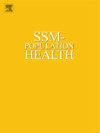在三十年的公共卫生研究中,治安作为健康的社会决定因素:系统回顾
IF 3.1
2区 医学
Q1 PUBLIC, ENVIRONMENTAL & OCCUPATIONAL HEALTH
引用次数: 0
摘要
本研究探讨了如何在公共卫生研究文献(如美国的健康的社会决定因素(SDOH))中使用的关键理论框架中分析警务和警察暴力。方法:我们回顾了1990年至2021年发表的关于美国人口和/或居住在美国南部边境的人的文章,并发表在公共卫生期刊上,以分析警务与SDOH之间的关系。通过检索重点学术数据库和筛选结果,25篇文章符合纳入标准。结果论文确定的关键主题包括生态社会理论和压力;将警察暴力定性为一种种族主义的研究;警察在执行严厉的移民政策中的作用;研究重点是警察的骚扰和恐惧如何限制获得医疗保健资源;以及使用SDOH预测警察死亡人数的研究。这些研究提供了有说服力的证据,表明警务对健康和健康的关键社会决定因素具有重大和有害的影响。然而,没有一项研究关注健康的决定因素,如社会梯度、失业或邻里特征,如食物或交通。警务对其他关键决定因素的影响,如工作、社会支持和社会包容,仅在对街头性工作者和注射吸毒者等犯罪人群的研究中得到描述。其他限制包括缺乏研究来证实警察行为与不良健康结果之间存在联系的假定的生物学或社会途径。本文章由计算机程序翻译,如有差异,请以英文原文为准。
Policing as a social determinant of health in three decades of public health research: A systematic review
Background
This study explores how policing and police violence are analyzed in critical theoretical frameworks used in public health research literature such as the Social Determinants of Health (SDOH) in the United States.
Methods
We reviewed articles published from 1990 to 2021 that studied U.S. populations and/or those residing at the U.S. southern border and appeared in public health journals to analyze the relationship between policing and the SDOH. After searching key academic databases and screening the results, 25 articles met the criteria for inclusion in the review.
Results
The key themes identified in the papers include ecosocial theory and stress; research that characterizes police violence as a form of racism; the role of policing in enforcing harsh immigration policies; research that focuses on how police harassment and fear limit access to health care resources; and research that uses the SDOH to predict police fatalities.
Conclusions
The studies reviewed provide persuasive evidence that policing has significant and harmful effects on health and critical social determinants of health. However, none of the research focused on determinants of health such as the social gradient, unemployment or neighborhood features like food or transportation. The impact of policing on other critical determinants such as work, social support, and social inclusion were only described in studies of criminalized populations such as street sex workers and injection drug users. Other limitations include the lack of research confirming hypothesized biological or social pathways showing the links between police behavior and adverse health outcomes.
求助全文
通过发布文献求助,成功后即可免费获取论文全文。
去求助
来源期刊

Ssm-Population Health
PUBLIC, ENVIRONMENTAL & OCCUPATIONAL HEALTH-
CiteScore
6.50
自引率
2.10%
发文量
298
审稿时长
101 days
期刊介绍:
SSM - Population Health. The new online only, open access, peer reviewed journal in all areas relating Social Science research to population health. SSM - Population Health shares the same Editors-in Chief and general approach to manuscripts as its sister journal, Social Science & Medicine. The journal takes a broad approach to the field especially welcoming interdisciplinary papers from across the Social Sciences and allied areas. SSM - Population Health offers an alternative outlet for work which might not be considered, or is classed as ''out of scope'' elsewhere, and prioritizes fast peer review and publication to the benefit of authors and readers. The journal welcomes all types of paper from traditional primary research articles, replication studies, short communications, methodological studies, instrument validation, opinion pieces, literature reviews, etc. SSM - Population Health also offers the opportunity to publish special issues or sections to reflect current interest and research in topical or developing areas. The journal fully supports authors wanting to present their research in an innovative fashion though the use of multimedia formats.
 求助内容:
求助内容: 应助结果提醒方式:
应助结果提醒方式:


